Why don’t Sunak and Starmer have anything to say to disabled people like me?
Is the reason the two main parties haven’t had anything to say to – or about – disabled people because they have nothing good to offer? James Moore asks why they’ve been forgotten


You’d be forgiven, three weeks into the general election campaign, for growing weary of the weird and wonderful policies being bandied about by politicians trying to convince you that they deserve your vote.
You name it, we’ve heard it: the Tories want national service for 18-year-olds, Labour wants to renationalise the railways, the Lib Dems are even trying to get more football matches on free TV.
But there is one community, of millions of people, who have so far been forgotten: the party leaders have not yet had anything to say about how they plan to people with disabilities.
A research briefing in the House of Commons Library says that there are approximately 16 million people with disabilities in Britain, almost a quarter (24 per cent) of the population. Take it from me, as one of them: we have “issues”. Real problems. Real concerns. They are wide-ranging.
Not least access: to public services, healthcare or just shops and cafes. The world of work can be highly challenging. Disability charity Scope notes that the gap in the rate of employment between us and our non-disabled peers stands at roughly 30 per cent, a figure that hasn’t changed much in a decade.
The extra costs we incur are ruinous. Scope’s calculation puts the disability price tag at nearly £1,000 a month. Having just put down a deposit of £2,500 for a new wheelchair, I know all about that.
Then there is the everyday ableism that rarely gets discussed. From the microaggressions to the outright abuse hurled at us as we make our way home, it’s exhausting, hurtful and demoralising.
Yet, while the election campaign has featured claims and counter-claims, insults, fantasy economics, and (often expensive) offers pitched at specific groups, the disabled community has barely merited a whisper.
Ed Davey has, in fairness, spoken about his disabled son, and his experience of looking after him has influenced the Lib Dems’ social care offer. But Ed Davey isn’t going to be the next prime minister. Keir Starmer is, according to the polls, with Rishi Sunak the most plausible alternative – albeit in a distant second place. Neither of them has so far had anything meaningful to say on the subject.
This has not gone unnoticed. Fazilet Hadi, head of policy at Disability Rights UK, is unimpressed: “The election campaign is definitely ignoring the millions of citizens living in poverty including disabled people. There is no recognition of inequalities, attitudinal and institutional barriers, widening gaps in living standards, inaccessible housing, and the list goes on.”
James Taylor, director of strategy at Scope, is similarly concerned: “On key issues like disability employment, attitudes towards disabled people and extra costs, our political parties have been strangely silent. Even when the election was announced there wasn’t a British sign language interpreter. One in four of us is disabled and we shouldn’t be an afterthought.”
So why isn’t it happening? Partly I suspect it is because of how few disabled people are represented in parliament. When was the last time you saw a wheelchair in the House of Commons chamber? Or a guide dog? The post of minister for disabled people has even been downgraded during Sunak’s short premiership; a clear sign of where we are on the prime minister’s list of priorities.
However, there is another potential reason for Keir Starmer and Rishi Sunak ignoring us, and I confess it keeps me up at night. Let me explain: dumping on disabled people doesn’t tend to poll well. After the government launched its consultation on reforming the Personal Independence Payment (PIP) – described by Scope as a full frontal assault on disabled people – a poll found that twice as many people thought benefits were either too low or far too low (38 per cent) as judged them to be too high or far too high (18 per cent).
Could it be that the lack of discussion is because neither of the two main parties have anything good to discuss and they don’t want to upset the voters? Is there no light at the end of the tunnel for disabled people after 14 long years of Tory rule? There are still a few weeks to go but thus far, one thing seems clear: it’ll be more of the same for the millions of us living with disabilities.






Join our commenting forum
Join thought-provoking conversations, follow other Independent readers and see their replies
Comments